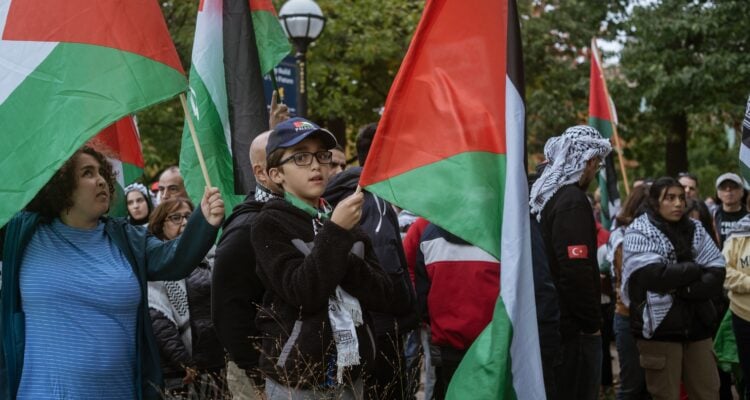‘What we are seeing is not a random emotional response but the fruition of 20 years of groundwork and preparation by several anti-Israeli, pro-terror groups.’
By Simon Sherman, JNS
Over the past few weeks, dramatic scenes of mob action have unfolded across dozens of campuses across the United States.
Large groups of students, faculty and professional agitators have taken over major swaths of quads and other areas to voice support for the Hamas terror organization and to intimidate pro-Israeli and Jewish students. These protests have often taken the form of encampments in central locations on university grounds, which have prevented Jewish students from accessing classes and other facilities.
In several cases, the catatonic response of the university administration has encouraged these protesters to escalate their tactics, including the destruction of property, physical violence against students, seizure of buildings and even holding university staff against their will. Chants in support of Hamas, the Houthis, Iran, bombing Israel and general terrorist action have been the consistent soundtrack in the background of all these protests.
The synchronized eruption of these protests, the use of common talking points and well-oiled logistics surrounding the supply of sleeping arrangements, food, water and medical support for the protesters have raised red flags surrounding the organization and funding for this spontaneous phenomenon.
“What we are seeing is not a random emotional response but the fruition of 20 years of groundwork and preparation by several anti-Israeli, pro-terror groups,” Gerald Steinberg, head of the Jerusalem-based NGO Monitor organization, told JNS. A closer look into the organizational structure of these mob actions reveals a complex web of student groups, NGOs, nonprofits and even foreign governments.
On the surface level, there is a series of student groups that are organizing these protests—the most prominent among them being Students for Justice in Palestine (SJP), Jewish Voice for Peace (JVP) and Within Our Lifetime (WOL). “SJP has no U.S. revenue service (IRS) status and most of the money sources are hidden, which raises major concerns,” Steinberg said. “There is simply no transparency about who is funding them.”
Hatem Bazian, the founder of SJP, is one of the clearest links between these protests and terror organizations. Bazian was previously a major fundraiser for the Ohio-based nonprofit Kindhearts, which was censured in 2006 by the U.S. Treasury Department for giving money to Hamas. Kindhearts settled with the Treasury Department and was dissolved in 2012 over the 2006 case.
Bazian was also a prominent advocate and speaker for the Islamic Association for Palestine (IAP), which shut down after it was found liable in civil court in 2004 for its support of Hamas. “Hatem Bazian, the head of SJP, has clear connections to various terror organizations,” Steinberg told JNS.
A recent report by the New York-based Institute for the Study of Global Antisemitism and Policy (ISGAP) shed some light on the source of SJP’s funding. ISGAP found the central donors to be Westchester People’s Action Coalition (WESPAC); Tides Foundation; American Muslims for Palestine (AMP), its parent organization Americans for Justice in Palestine (AJP); and JVP.
Bazian is also a co-founder of AMP. AMP is currently under investigation by the Virginia Attorney General after being accused of being a reincarnation of the IAP. Its former executive director, Abdelbaset Hamayel, and its current one, Osama Abuirshaid, were IAP board members and directors, respectively.




